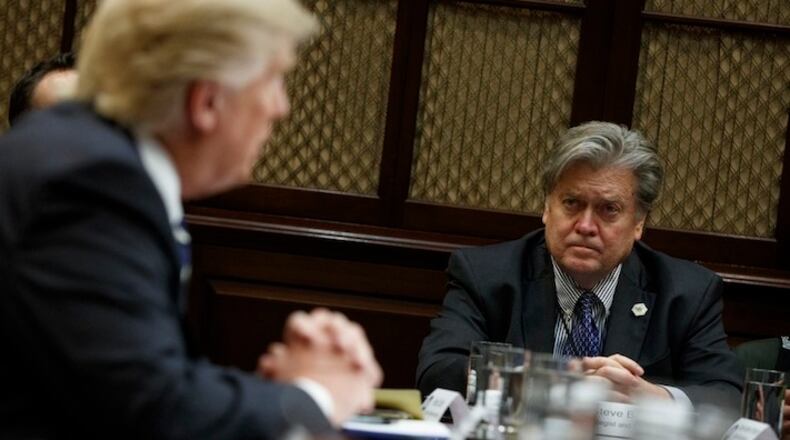President Donald Trump's executive order giving White House chief strategist Steve Bannon a permanent role on the National Security Council has raised a lot of questions.
The order also demoted the director of national intelligence and the chairman of the Joint Chiefs of Staff from their positions as principal members of the council.
Why the outrage? Here's a brief overview of the National Security Council and the controversy surrounding Bannon's appointment.
Q: What is the U.S. National Security Council?
A: It's a panel composed of top national security advisers and Cabinet members who guide the president on national and foreign affairs.
Q: When was the National Security Council created, and why?
A: It was founded in 1947 under President Harry Truman with the aim of strengthening lines of conversation among branches of the military, intelligence agencies and certain members of the presidential Cabinet in the face of growing tension with the Soviet Union.
Members of the council are there to help the president make sound decisions in the arenas of national security and foreign policy.
Q: What decision-making power does the National Security Council hold today?
A: While the NSC does not issue policy changes itself, it serves as a way to coordinate policy shifts throughout various agencies, said Loren Schulman, a senior fellow at the Center for a New American Security, a Washington-based think tank. It also informs — and potentially sways — the decisions of the president.
"Members of the National Security Council ... will sometimes make policy decisions or policy calls based on their own authority," Schulman said. "Not everything has to go through the president, but if you run a good process, you know generally what the president's views are."
The council has been growing in power with each successive administration. This includes the Obama administration, which Schulman said faced complaints that "many issues had to go to senior levels for decisions that should have been delegated out."
With this in mind, she said it was not unlikely that the Trump administration would consolidate more power in the White House, even if the executive order signaled the opposite intention.
Q: Why is Trump's appointment of Bannon to the National Security Council through an executive order so controversial?
A: It's the first time that a White House chief strategist is a member of the council's "principals committee," which involves top officials dealing with issues of national security. This move has troubled many because Bannon serves as a political adviser to the president, focused on an entirely different realm. The former executive chairman of the far-right Breitbart website also is known for his hard-line opposition to globalism and ties to the white nationalist movement.
Schulman said this appointment was troubling for many because it placed Bannon, who was helping Trump push a domestic political agenda, alongside national security professionals on a council meant to be apolitical.
If Bannon is "creating Trump's worldview, I can understand why Trump would want him in the room," Schulman said. "But I can understand why other people would not want him in the room for the same reason."
Q: Is that the only reason for the controversy?
A: No. Bannon's ascension coincided with the removal of the director of national intelligence, who oversees the 16 member agencies of the U.S. intelligence community, and the chairman of the Joint Chiefs of Staff, the highest-ranking military officer in the U.S. armed forces, from permanent status on the principals committee.
This means they will attend meetings only when, according to the presidential memorandum released Saturday, "issues pertaining to their responsibilities and expertise are to be discussed."
But the day after the executive order was released to a backlash, White House Chief of Staff Reince Priebus said the director of national intelligence and the chairman of the Joint Chiefs of Staff were welcome — but not required — to attend any meeting they wished.
Q: Does the executive order do anything else?
A: It also allows Vice President Mike Pence to chair a National Security Council meeting if Trump can't attend.
This is something that's unheard of, Schulman said.
"That is very new," she said. "If the president is not there, it's not considered a conclusive National Security Council meeting."
Although not originally part of the executive order, CIA Director Mike Pompeo also will be added to the National Security Council, White House spokesman Sean Spicer said Monday. The chief of the CIA hasn't had a seat at the council since 2005, according to Spicer.
Q: Is there any precedent for Trump's appointment of Bannon to the National Security Council?
A: Schulman said no.
"Everyone I have seen talk about (Bannon's promotion) said it's within its own territory," she said. "Bannon's role is to advocate for a domestic political agenda — not to be there as a national security professional — which everyone else around the table, that's their role."
Karl Rove, the chief strategist for President George W. Bush's 2000 presidential campaign, was not allowed to attend National Security Council meetings, even though he was a senior adviser to the president at the time, according to Josh Bolten, Bush's chief of staff, in a 2016 White House Transition Project document.
Likewise, President Barack Obama did not offer David Plouffe or David Axelrod, top advisers in his presidential campaigns, positions on the principals committee. Axelrod was known, however, to attend NSC meetings occasionally at the invitation of Obama.
About the Author
Keep Reading
The Latest
Featured



